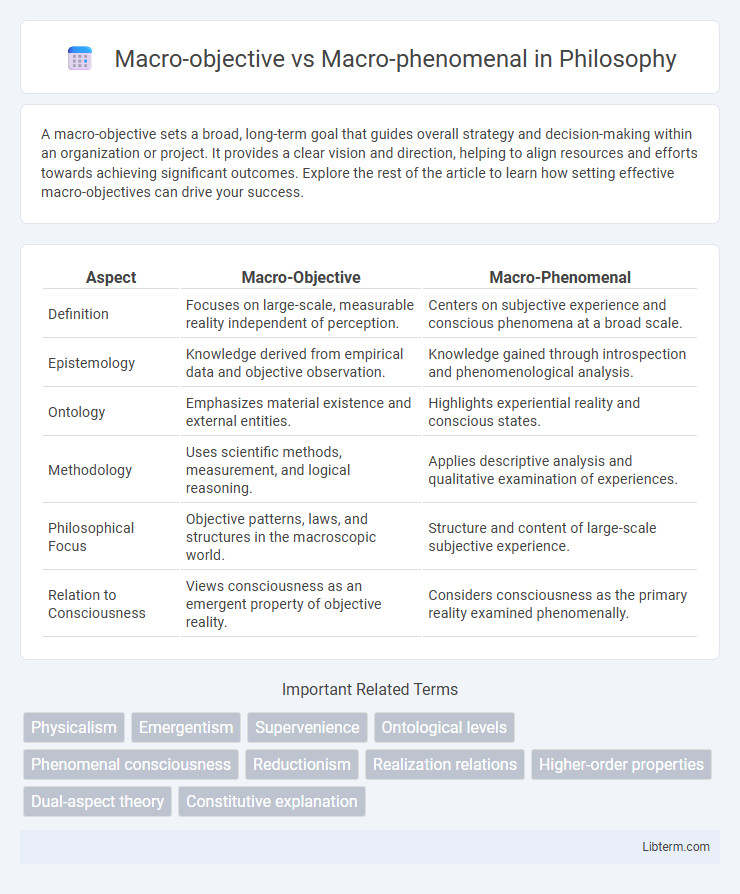A macro-objective sets a broad, long-term goal that guides overall strategy and decision-making within an organization or project. It provides a clear vision and direction, helping to align resources and efforts towards achieving significant outcomes. Explore the rest of the article to learn how setting effective macro-objectives can drive your success.
Table of Comparison
| Aspect | Macro-Objective | Macro-Phenomenal |
|---|---|---|
| Definition | Focuses on large-scale, measurable reality independent of perception. | Centers on subjective experience and conscious phenomena at a broad scale. |
| Epistemology | Knowledge derived from empirical data and objective observation. | Knowledge gained through introspection and phenomenological analysis. |
| Ontology | Emphasizes material existence and external entities. | Highlights experiential reality and conscious states. |
| Methodology | Uses scientific methods, measurement, and logical reasoning. | Applies descriptive analysis and qualitative examination of experiences. |
| Philosophical Focus | Objective patterns, laws, and structures in the macroscopic world. | Structure and content of large-scale subjective experience. |
| Relation to Consciousness | Views consciousness as an emergent property of objective reality. | Considers consciousness as the primary reality examined phenomenally. |
Defining Macro-Objective: Core Concepts
Macro-objective refers to large-scale, quantifiable goals that guide strategic planning and decision-making in organizations or systems. It encompasses measurable outcomes such as economic growth targets, environmental sustainability benchmarks, or social development indicators, ensuring alignment with overarching agendas. Defining macro-objective involves specifying clear, data-driven objectives that provide direction for coordinated actions and resource allocation at a systemic level.
Understanding Macro-Phenomenal: Key Insights
Understanding macro-phenomenal experiences involves analyzing the holistic patterns emerging from large-scale phenomena, which differ from macro-objective perspectives focused on quantifiable data. Key insights reveal that macro-phenomenal approaches emphasize subjective interpretations and collective awareness, enriching comprehension of social and environmental dynamics. This distinction highlights the importance of integrating qualitative sensations with objective metrics for a deeper grasp of complex systems.
Historical Context: Origins of Both Perspectives
The macro-objective perspective traces its origins to Enlightenment-era scientific rationalism, emphasizing measurable, external realities shaping history and society. In contrast, the macro-phenomenal approach emerged from phenomenology and existential philosophy in the early 20th century, focusing on collective human experience and consciousness as foundational to understanding historical phenomena. Both perspectives reflect distinct intellectual traditions that continue to influence contemporary debates in historiography and social theory.
Philosophical Foundations: Objectivity vs. Phenomenality
Macro-objective perspectives emphasize objectivity grounded in universal truths and measurable phenomena, asserting that reality exists independently of perception. Macro-phenomenal views prioritize phenomenality, focusing on conscious experience and the subjective qualities of phenomena as fundamental to understanding reality. The philosophical foundation contrasts the external, observer-independent existence (macro-objective) with the internal, experience-based reality (macro-phenomenal), highlighting a core debate between ontological objectivity and phenomenological subjectivity.
Differences Between Macro-Objective and Macro-Phenomenal
Macro-objective refers to external, measurable phenomena observed and quantified by instruments or scientific methods, while macro-phenomenal pertains to subjective experiences and consciousness accessible only to the individual observer. The key difference lies in the macro-objective's empirical verifiability versus the macro-phenomenal's introspective nature. Understanding these distinctions is crucial in fields like philosophy of mind and cognitive science, where objective data and subjective experience interplay.
Intersections and Overlaps: Where They Meet
Macro-objectives concentrate on large-scale, measurable goals that drive organizational or project success, while macro-phenomenal perspectives emphasize broad experiential or perceptual phenomena affecting human understanding. Intersections occur when strategic aims align with collective experiences, shaping impactful outcomes through shared meaning and purpose. Overlaps emerge in areas like organizational culture and societal trends where tangible objectives meet intangible human factors, facilitating holistic approaches to complex challenges.
Implications in Scientific Inquiry
Macro-objective perspectives in scientific inquiry emphasize measurable, observable phenomena, fostering empirical validation and reproducibility, which strengthens hypothesis testing and theory development. Macro-phenomenal approaches prioritize subjective experience and consciousness, challenging traditional empirical methods and encouraging interdisciplinary frameworks that incorporate phenomenology and cognitive science. Integrating both perspectives enriches scientific understanding by accommodating objective data and experiential insights, potentially leading to more holistic models of complex phenomena.
Applications in Cognitive Science and Philosophy
Macro-objective perspectives in cognitive science emphasize observable, measurable phenomena such as brain activity and behavioral patterns, enabling rigorous empirical investigations and computational modeling. Macro-phenomenal approaches focus on subjective experiences and qualitative aspects of consciousness, providing insights into the phenomenology of cognition and informing philosophical theories of mind. Integrating these perspectives enhances understanding of mental processes by bridging objective data with the lived experience of consciousness, critical for advancing both cognitive science research and philosophical discourse on the nature of mind.
Challenges and Criticisms of Each Approach
The macro-objective approach in consciousness studies faces challenges related to its reliance on objective, third-person data, often criticized for neglecting the subjective, qualitative aspects of experience. Conversely, the macro-phenomenal approach emphasizes first-person subjective experience but struggles with replicability and scientific validation, leading to criticisms about its empirical robustness. Both approaches encounter difficulties in integrating subjective and objective data, posing a fundamental challenge to creating a comprehensive theory of consciousness.
Future Directions: Integrating Macro-Objective and Macro-Phenomenal
Future directions in research emphasize integrating macro-objective and macro-phenomenal perspectives to create a comprehensive framework for understanding complex systems. This integration aims to align objective measurements, such as large-scale quantitative data, with subjective experiential phenomena observed at the macro level. Advancements in computational modeling and interdisciplinary methodologies are key to bridging these domains, enhancing predictive accuracy and deepening insights into emergent behaviors.
Macro-objective Infographic

 libterm.com
libterm.com